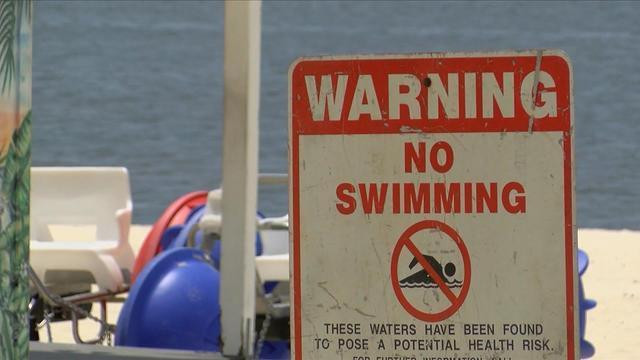
A massive influx of freshwater sent down the Mississippi River due to heavy rains throughout the basin is wreaking havoc on coastal communities in Louisiana and in Mississippi — where the state has closed all beaches to swimming.
And it looks like more rain is on the way, thanks to a low-pressure system over the Florida Panhandle, which is expected to move out over the Gulf and strengthen into the season’s second tropical storm this week. (See our hurricane page for updates.)
The Mississippi Department of Environmental Quality has closed all of the state’s beaches to swimming due to an outbreak of toxic blue-green algae. The algal bloom is believed to have been caused by the opening of the Bonnet Carre spillway in Louisiana, which was partially opened to offset a rising Mississippi River that swelled due to an especially wet winter in the Mississippi Valley. MDEQ began the beach closures in June and advises people, and their pets, to avoid contact, including swimming, with the blue-green algae because exposure can be harmful.
Louisiana health officials have also issued advisories due to a large bloom in Lake Pontchartrain and high fecal coliform levels on a dozen beaches. Lake Charles South Beach was also closed.
- Mississippi beaches map
- Louisiana beaches map
- Handy blue-green FAQ from Mississippi-Alabama Sea Grant
Better Tracking Tools for Toxic Algae
A new study led by NOAA and GCOOS and published in the peer-review journal PLoS ONE shows that citizen science volunteers using a relatively low-cost tool can help increase the size and accuracy of a red tide monitoring network to better protect public health from the impacts of toxic algae in the Gulf of Mexico.
The study — “HABscope: A tool for use by citizen scientists to facilitate early warning of respiratory irritation caused by toxic blooms of Karenia brevis” — shows that it’s possible to:
- Increase red tide monitoring over a wider geographic area;
- Provide more accurate scientific data about red tide concentrations based on water samples instead of anecdotal reports from beach observers;
- Expand the red tide monitoring network throughout the Gulf states in a cost-effective fashion.
- Read the Study
- Handy Mississippi-Alabama Sea Grant FAQ on red tide













